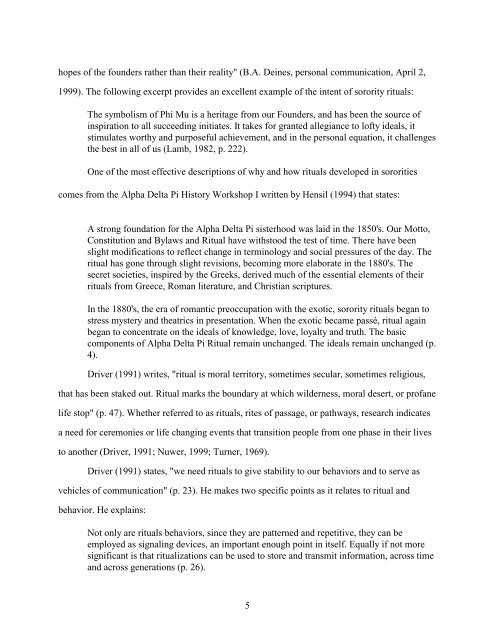Sorority Rituals - Reflections On Rites of ... - Mari Ann Callais
Sorority Rituals - Reflections On Rites of ... - Mari Ann Callais
Sorority Rituals - Reflections On Rites of ... - Mari Ann Callais
Create successful ePaper yourself
Turn your PDF publications into a flip-book with our unique Google optimized e-Paper software.
hopes <strong>of</strong> the founders rather than their reality" (B.A. Deines, personal communication, April 2,<br />
1999). The following excerpt provides an excellent example <strong>of</strong> the intent <strong>of</strong> sorority rituals:<br />
The symbolism <strong>of</strong> Phi Mu is a heritage from our Founders, and has been the source <strong>of</strong><br />
inspiration to all succeeding initiates. It takes for granted allegiance to l<strong>of</strong>ty ideals, it<br />
stimulates worthy and purposeful achievement, and in the personal equation, it challenges<br />
the best in all <strong>of</strong> us (Lamb, 1982, p. 222).<br />
<strong>On</strong>e <strong>of</strong> the most effective descriptions <strong>of</strong> why and how rituals developed in sororities<br />
comes from the Alpha Delta Pi History Workshop I written by Hensil (1994) that states:<br />
A strong foundation for the Alpha Delta Pi sisterhood was laid in the 1850's. Our Motto,<br />
Constitution and Bylaws and Ritual have withstood the test <strong>of</strong> time. There have been<br />
slight modifications to reflect change in terminology and social pressures <strong>of</strong> the day. The<br />
ritual has gone through slight revisions, becoming more elaborate in the 1880's. The<br />
secret societies, inspired by the Greeks, derived much <strong>of</strong> the essential elements <strong>of</strong> their<br />
rituals from Greece, Roman literature, and Christian scriptures.<br />
In the 1880's, the era <strong>of</strong> romantic preoccupation with the exotic, sorority rituals began to<br />
stress mystery and theatrics in presentation. When the exotic became passé, ritual again<br />
began to concentrate on the ideals <strong>of</strong> knowledge, love, loyalty and truth. The basic<br />
components <strong>of</strong> Alpha Delta Pi Ritual remain unchanged. The ideals remain unchanged (p.<br />
4).<br />
Driver (1991) writes, "ritual is moral territory, sometimes secular, sometimes religious,<br />
that has been staked out. Ritual marks the boundary at which wilderness, moral desert, or pr<strong>of</strong>ane<br />
life stop" (p. 47). Whether referred to as rituals, rites <strong>of</strong> passage, or pathways, research indicates<br />
a need for ceremonies or life changing events that transition people from one phase in their lives<br />
to another (Driver, 1991; Nuwer, 1999; Turner, 1969).<br />
Driver (1991) states, "we need rituals to give stability to our behaviors and to serve as<br />
vehicles <strong>of</strong> communication" (p. 23). He makes two specific points as it relates to ritual and<br />
behavior. He explains:<br />
Not only are rituals behaviors, since they are patterned and repetitive, they can be<br />
employed as signaling devices, an important enough point in itself. Equally if not more<br />
significant is that ritualizations can be used to store and transmit information, across time<br />
and across generations (p. 26).<br />
5



